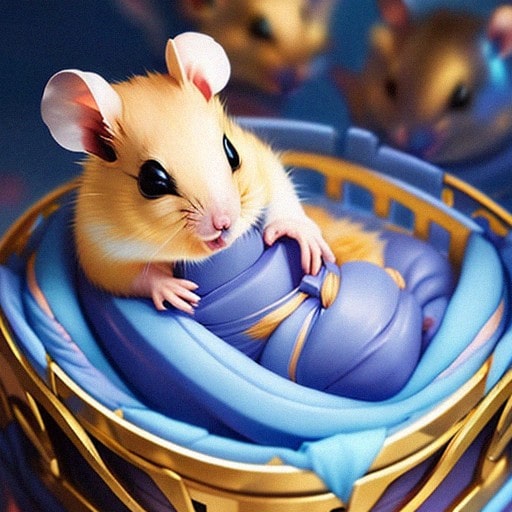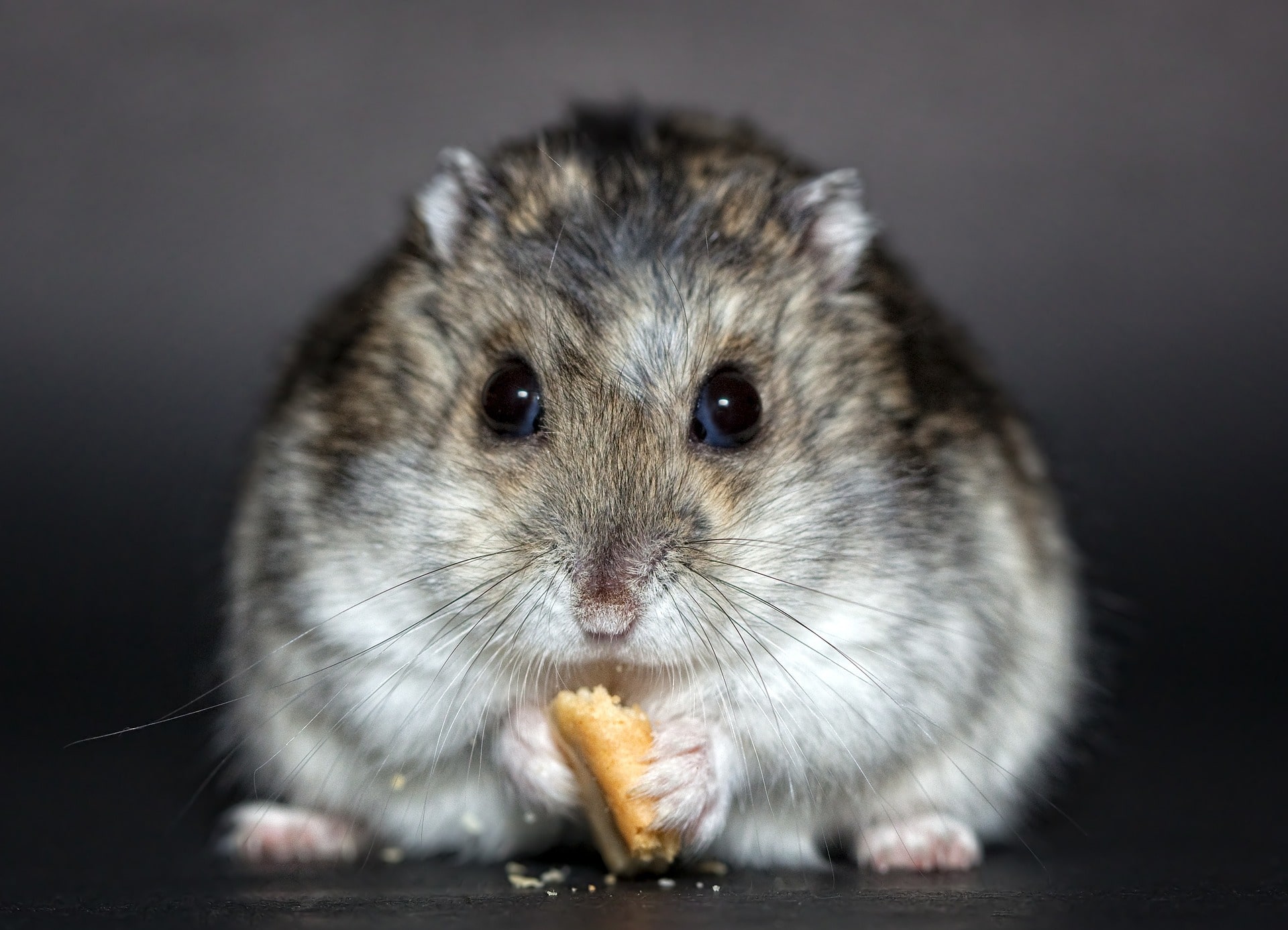Bringing a newborn hamster home can be a thrilling and exciting experience. However, it also comes with a great deal of responsibility. As a new pet parent, it’s important to understand how to properly care for your newborn hamster. This will ensure a happy and healthy life for your tiny friend.
In this article, we will discuss everything you need to know about caring for a newborn hamster. Some essentials include: proper housing, nutrition, and healthcare. This is an exciting journey for you, and we are delighted to be your guide.

A Hamster Star is Born
Weaning your hamster pups can be a bit of a challenge, but it’s also an important step in their development. To wean your hamster pups, start by offering them solid food alongside their mother’s milk. Gradually decrease the amount of milk you offer until your hamster pups are fully weaned and eating solid food on their own. This process usually takes 2-3 weeks.
When hamster pups reach 4-5 weeks old, they are ready to be separated from their mother. At this age, they have fully weaned and gained the capability to eat solid food. Keeping hamster pups together until they are ready for separation is crucial as it allows them to socialize and form essential social skills.
Once your hamster pups are fully weaned, you can start introducing them to new foods and flavors. Offer a variety of fresh fruits and vegetables, hamster food, and occasional treats. Be sure to offer new foods in small quantities and to monitor your hamster pups for any signs of digestive upset.
Caring for hamster pups can be a bit of a challenge, but it’s also incredibly rewarding. You can expect your hamster pups to be active and playful, and they’ll require a lot of attention and care. You’ll need to provide them with a safe and spacious cage, plenty of food and water, and plenty of toys and accessories to keep them entertained.
Baby Hamster Housing
The first step to care for a newborn hamster is to provide them with the perfect habitat. A small cage or terrarium with a wire mesh top is ideal, as it allows for proper ventilation and allows you to easily monitor your hamster. The cage should be at least 2 feet by 2 feet, and should include a nesting area, a sleeping area, and a place for your hamster to exercise.
The nesting area should be a small, enclosed space that provides your hamster with a sense of security. You can use a small plastic container or a paper towel tube to create this area. The sleeping area should be a cozy spot where your hamster can rest and sleep, such as a small hammock or a pile of soft bedding.
The exercise area should be a large enough area for your hamster to run around and play. A wheel or a small climbing structure are great options for this area.
A clean and healthy environment is essential for your hamster pups’ well-being. Clean their cage regularly and be sure to replace their bedding and litter as needed. Offer fresh water and food daily, and replace any old or moldy food immediately. Keeping your hamster pups’ environment clean will help prevent illness and will ensure they stay happy and healthy.

Nutritional Care for a Newborn Hamster
Proper nutrition is essential for the growth and development of a newborn hamster. Hamster pups will start eating solid food at around 4 weeks of age. But they’ll still need to nurse from their mother until they’re fully weaned.
You can offer a variety of foods to your hamster pups, including fresh fruits and vegetables, hamster food, and occasional treats. It’s important to offer fresh water at all times and to provide a variety of foods to ensure your hamster pups get the nutrients they need.
It is also important to provide your hamster with fresh water at all times. A water bottle with a sipper tube is the best option. This allows your hamster to easily access the water without making a mess.
Providing Toys and Accessories for Your Hamster Pups
Hamster pups are active and playful, and they need plenty of toys and accessories to keep them entertained. Offer a variety of toys, such as tunnels, balls, and climbing structures, and be sure to rotate them regularly to keep your hamster pups interested. You can also provide chew toys to help keep your hamster pups’ teeth trimmed and healthy. Some great options include wooden chews, natural wicker balls, and cardboard tubes.
Hamster pups need plenty of exercise to stay healthy and happy. Create a playtime routine for your hamster pups by allowing them to play outside of their cage for a set amount of time each day. This is a great opportunity for you to bond with your hamster pups and to watch them play and explore. Just be sure to supervise them at all times and to provide a safe play area.
Health Care for a Newborn Hamster
It’s important to regularly monitor your hamster pups’ health and well-being. Keep an eye out for any signs of illness or distress, such as lethargy, diarrhea, or an unusual change in appetite. If you notice any signs of illness, be sure to consult with your veterinarian right away. Regular veterinary check-ups are also recommended to ensure your hamster pups are healthy and growing properly.
Regular grooming is also an important aspect of health care. You should brush your hamster’s fur regularly to prevent matting and to remove loose hair. You should also trim your hamster’s nails as needed.

Handling and Bonding with Your Hamster Pups
Hamster pups are naturally curious and friendly, making them great pets for families with children. To bond with your hamster pups, handle them gently and frequently. Offer them treats and play with them regularly. The more you interact with your hamster pups, the more bonded you’ll become, and the more they’ll trust and enjoy your company.
As your hamster pups grow, they’ll need more space, toys, and accessories to keep them entertained and healthy. Start preparing for their future by upgrading their cage to a larger size as needed and by purchasing additional toys and accessories. Keep in mind that hamster pups grow quickly, so it’s important to be proactive in their care. If you care for your newborn hamster well, you will have a friend for life.
Hamster pups will eventually need to be separated from one another. They can become territorial and aggressive towards each other as they get older. It’s important to separate your hamster pups when they’re around 4-5 months old. Moreover, make sure to provide each hamster with their own cage and toys. This will help prevent fighting and ensure that each hamster has plenty of space and resources to call their own.
Adopting Out Newborn Hamsters: What to Consider
If you have more hamster pups than you can care for, consider adopting them out to loving homes. When adopting out hamster pups, it’s important to do your research and to find responsible, loving homes. You can also consult with local animal shelters or rescues, or advertise your hamster pups on pet-specific websites or social media platforms.
To care for a newborn hamster pup is a life-long commitment. As with any pet, hamster pups require ongoing care and attention, and it’s important to be prepared for this responsibility. By following the tips and guidelines outlined in this article, you can ensure your hamster pups receive the best possible care and live happy, healthy lives. From feeding them a balanced diet and providing them with plenty of playtime to monitoring their health and well-being, it’s important to be attentive to their needs and to be proactive in their care.
Caring for hamster pups is a fun and rewarding experience, but it does require time, patience, and dedication. Whether you’re new to hamster ownership or have been a hamster parent for years, it’s important to keep learning and growing in your knowledge and understanding of hamster behavior and care. With the right resources and support, you can provide your hamster pups with a happy and healthy home and ensure that they thrive for years to come.
